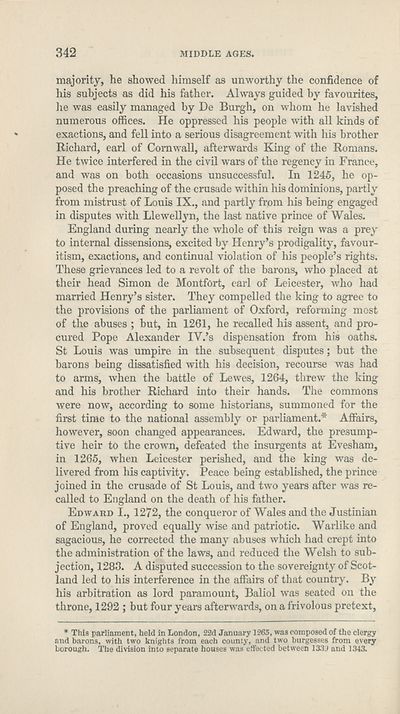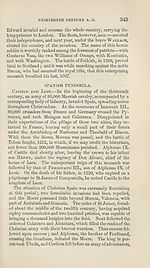Download files
Complete book:
Individual page:
Thumbnail gallery: Grid view | List view

342
MIDDLE AGES.
majority, he showed himself as unworthy the confidence of
his subjects as did his father. Always guided by favourites,
he was easily managed by De Burgh, on whom he lavished
numerous offices. He oppressed his people with all kinds of
exactions, and fell into a serious disagreement with his brother
Richard, earl of Cornwall, afterwards King of the Romans.
He twice interfered in the civil wars of the regency in France,
and was on both occasions unsuccessful. In 1245, he op¬
posed the preaching of the crusade within his dominions, partly
from mistrust of Louis IX., and partly from his being engaged
in disputes with Llewellyn, the last native prince of Wales.
England during nearly the whole of this reign was a prey
to internal dissensions, excited by Henry’s prodigality, favour¬
itism, exactions, and continual violation of his people’s rights.
These grievances led to a revolt of the barons, who placed at
their head Simon de Montfort, earl of Leicester, who had
married Henry’s sister. They compelled the king to agree to
the provisions of the parliament of Oxford, reforming most
of the abuses ; but, in 1261, he recalled his assent, and pro¬
cured Pope Alexander IV.’s dispensation from his oaths.
St Louis was umpire in the subsequent disputes; but the
barons being dissatisfied with his decision, recourse was had
to arms, when the battle of Lewes, 1264, threw the king
and his brother Richard into their hands. The commons
were now, according to some historians, summoned for the
first time to the national assembly or parliament.* Affairs,
however, soon changed appearances. Edward, the presump¬
tive heir to the crown, defeated the insurgents at Evesham,
in 1265, when Leicester perished, and the king was de¬
livered from his captivity. Peace being established, the prince
joined in the crusade of St Louis, and two years after was re¬
called to England on the death of his father.
Edward I., 1272, the conqueror of Wales and the Justinian
of England, proved equally wise and patriotic. Warlike and
sagacious, he corrected the many abuses which had crept into
the administration of the laws, and reduced the Welsh to sub¬
jection, 1283. A disputed succession to the sovereignty of Scot¬
land led to his interference in the affairs of that country. By
his arbitration as lord paramount, Baliol was seated on the
throne, 1292 ; but four years afterwards, on a frivolous pretext,
* This parliament, held in London, 22d January 1265, was composed of the clergy
and barons, with two knights from each county, and two burgesses from every
borough. The division into separate houses was effected between 13.V and 134a
MIDDLE AGES.
majority, he showed himself as unworthy the confidence of
his subjects as did his father. Always guided by favourites,
he was easily managed by De Burgh, on whom he lavished
numerous offices. He oppressed his people with all kinds of
exactions, and fell into a serious disagreement with his brother
Richard, earl of Cornwall, afterwards King of the Romans.
He twice interfered in the civil wars of the regency in France,
and was on both occasions unsuccessful. In 1245, he op¬
posed the preaching of the crusade within his dominions, partly
from mistrust of Louis IX., and partly from his being engaged
in disputes with Llewellyn, the last native prince of Wales.
England during nearly the whole of this reign was a prey
to internal dissensions, excited by Henry’s prodigality, favour¬
itism, exactions, and continual violation of his people’s rights.
These grievances led to a revolt of the barons, who placed at
their head Simon de Montfort, earl of Leicester, who had
married Henry’s sister. They compelled the king to agree to
the provisions of the parliament of Oxford, reforming most
of the abuses ; but, in 1261, he recalled his assent, and pro¬
cured Pope Alexander IV.’s dispensation from his oaths.
St Louis was umpire in the subsequent disputes; but the
barons being dissatisfied with his decision, recourse was had
to arms, when the battle of Lewes, 1264, threw the king
and his brother Richard into their hands. The commons
were now, according to some historians, summoned for the
first time to the national assembly or parliament.* Affairs,
however, soon changed appearances. Edward, the presump¬
tive heir to the crown, defeated the insurgents at Evesham,
in 1265, when Leicester perished, and the king was de¬
livered from his captivity. Peace being established, the prince
joined in the crusade of St Louis, and two years after was re¬
called to England on the death of his father.
Edward I., 1272, the conqueror of Wales and the Justinian
of England, proved equally wise and patriotic. Warlike and
sagacious, he corrected the many abuses which had crept into
the administration of the laws, and reduced the Welsh to sub¬
jection, 1283. A disputed succession to the sovereignty of Scot¬
land led to his interference in the affairs of that country. By
his arbitration as lord paramount, Baliol was seated on the
throne, 1292 ; but four years afterwards, on a frivolous pretext,
* This parliament, held in London, 22d January 1265, was composed of the clergy
and barons, with two knights from each county, and two burgesses from every
borough. The division into separate houses was effected between 13.V and 134a
Set display mode to:
![]() Universal Viewer |
Universal Viewer | ![]() Mirador |
Large image | Transcription
Mirador |
Large image | Transcription
| Antiquarian books of Scotland > Education > Elements of universal history on a new and systematic plan > (362) |
|---|
| Permanent URL | https://digital.nls.uk/127584484 |
|---|
| Description | Thousands of printed books from the Antiquarian Books of Scotland collection which dates from 1641 to the 1980s. The collection consists of 14,800 books which were published in Scotland or have a Scottish connection, e.g. through the author, printer or owner. Subjects covered include sport, education, diseases, adventure, occupations, Jacobites, politics and religion. Among the 29 languages represented are English, Gaelic, Italian, French, Russian and Swedish. |
|---|

